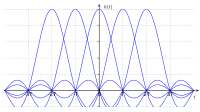
Photo from wikipedia
In this article, we analytically investigate the performance of a downlink multiuser (MU) multiple-input multiple-output (MIMO) orthogonal frequency division multiplexing (OFDM) system with hardware impairments. Specifically, we focus on the… Click to show full abstract
In this article, we analytically investigate the performance of a downlink multiuser (MU) multiple-input multiple-output (MIMO) orthogonal frequency division multiplexing (OFDM) system with hardware impairments. Specifically, we focus on the joint impact of nonideal oscillators and nonlinear high-power amplifiers, which can be quantified in terms of multiplicative and additive nonlinear distortions as well as phase noise, which causes inter-channel interference (ICI). We first derive the signal-to-distortion-plus-interference-plus-noise ratio (SDINR) and then utilize the SDINR to derive the closed-form expressions for symbol-error-rate and the average capacity of the aforementioned system. Our analysis shows that the statistics of an additive nonlinear distortion and additive white Gaussian noise are not affected by phase noise. However, the phase noise itself significantly deteriorates the performance of the MU-MIMO-OFDM system even in the absence of the nonlinear distortions. We further show that nonlinear distortion and ICI cause an irreducible error floor which considerably degrades the system error performance and also adversely affects the total capacity of the MU-MIMO-OFDM system. Comparisons are drawn between the performance of an ideal MU-MIMO-OFDM system and a MU-MIMO-OFDM system in presence of above impairments. In the end, we present the simulation results to validate the efficacy of our theoretical analysis.
Journal Title: IEEE Systems Journal
Year Published: 2021
Link to full text (if available)
Share on Social Media: Sign Up to like & get
recommendations!